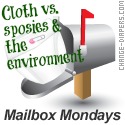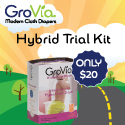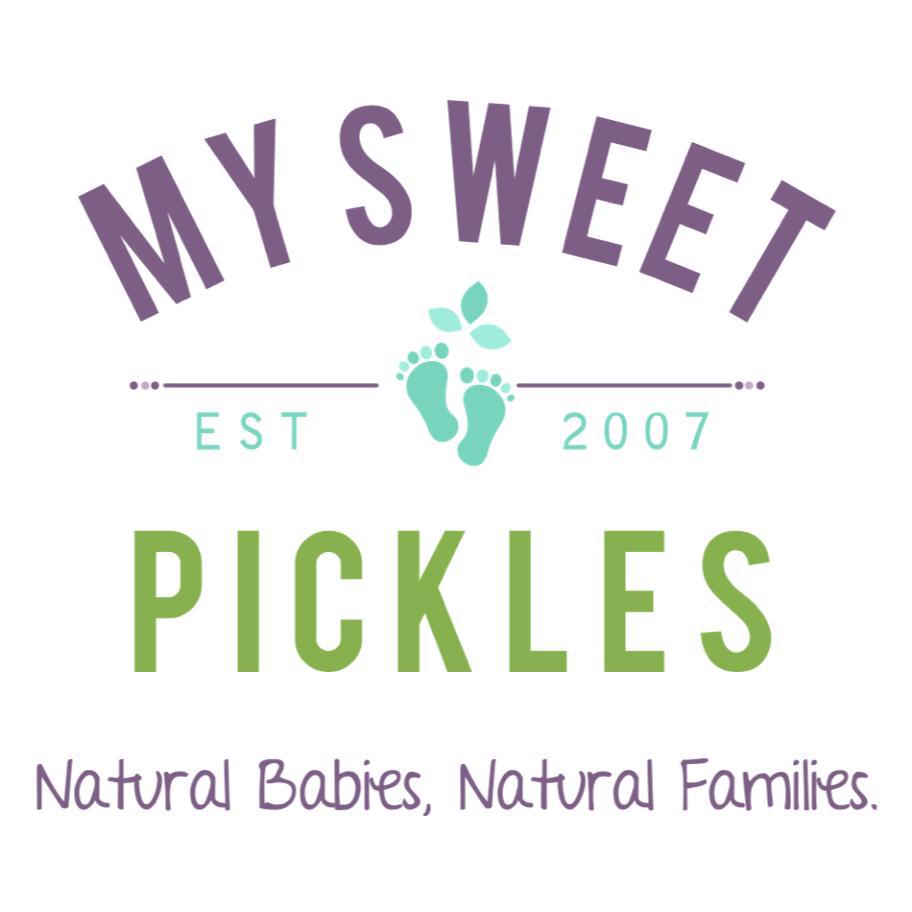Monday means Mailbox Mondays, or time for cloth diaper advice. I answer a reader submitted question, and ask my readers to help too!
Questions don’t have to be cloth diaper related, just email maria at change-diapers.com with “Mailbox Mondays” in the subject, or fill out my contact form for readers, which you will always be able to find on my Contact Page.
Suki says:
I recently made homemade detergent for cloth diapers to try it out. I posted the results of the first wash on Facebook. One person said that disposables are more environmentally friendly than cloth diapers because in order to kill the bacterial, detergents need sulfates that are really bad for the environment and a really bad water/soil pollutant and at least disposables are biodegradable.
Say what? I have never read this anywhere but she’s one of those types of people who researches way deep into things. I’m not sure where she found her information or what detergent she’s basing it on. It seems like she thinks that detergents without sulfates (which I thought most cloth diaper detergents didn’t have but then again, maybe I’m thinking phosphates) doesn’t clean. I didn’t bother to ask what she thought of regular laundry detergent which tends to be worse environmentally.
Hi Suki! Thanks for submitting this! I have heard various arguments that manufacturing and washing a cloth diaper has a greater environmental impact than disposing of a paper diaper. I have yet to see any compelling, unbiased, truthful evidence or statistical information to back this up.
My husband sent me an ABC news story from 2005: The Diaper Debate: Are Disposables as Green as Cloth? I have not read the studies referenced in the article, but it says that disposables vs. laundering cloth make the two a wash (pardon the pun) environmentally. (Lori Taylor of the RDA is quoted! Very cool!) A study done more than 20 years ago (before HE washing machines & modern cloth diapers) and commissioned by P&G “concluded that laundering a cloth diaper over the course of its lifetime consumes up to six times the water used to manufacture a single-use diaper.” My husband was baffled by this since they are talking about using a cloth diaper over it’s lifetime vs. manufacturing a single disposable diaper.
I have no idea if they included any parts of the manufacturing process other than water consumption (such as oil and other raw materials used), or the sustainability of cloth. The studies were additionally skewed/flawed in the type of diapers they were focusing on, the washing temperatures used, and the efficiency of the washers/dryers used.
One study sponsored by the National Association of Diaper Services (NADS) concluded that “disposable diapers produce seven times more solid waste when discarded and three times more waste in the manufacturing process.”
Before I go any further, I will say that while I love cloth diapers and advocate for them as much as I can, hoping that educating people will get them interested, I do not judge others for their parenting choices (diaper choices included.) I know that some people can be very judgmental, making other mothers feel very defensive of their choices. I get the feeling that at times people feel either self guilt for using disposables, or they feel guilted/belittled/judged by cloth diaper users. Therefore, they feel the need to not only justify their use of disposables, but to also “one up” the cloth diaperers, and prove that they’re not as great as they think they are.
Environmental impact was actually at the bottom of the list of my reasons for switching to cloth, after the health of my son, cost savings, and several more reasons. Therefore, even if someone was able to show me concrete evidence that cloth diapering was the less environmentally friendly diaper choice, I would still not be compelled to switch back.
Okay, so back to the subject at hand. Yes in fact, I have heard that phosphates (and other chemicals) in mainstream health & beauty products and household cleaning products (including laundry detergent) have a negative impact on groundwater. “When discharged into waterways [phosphates] cause excessive growth of algae, which can smell bad and which robs the water of oxygen that fish need to survive.” Hence the switch to limit or eliminate phosphates in products like dishwasher detergent. Europe is looking to ban phosphates in laundry detergents entirely. However, laundry detergent is behind agriculture (fertilizers and livestock feed) and human sewage as far as the sources of phosphates in groundwater.
Information on how long it takes a disposable diaper to biodegrade is wildly variable, from 200-1000 years. Some say the plastic components will never biodegrade. Since garbage in landfills is compacted, and generally won’t see light, air, or much moisture (all things needed for decomposition to occur), many/most discarded items never biodegrade period. I read the book Rubbish!: The Archaeology of Garbage last year and now I feel like I need to read it again. It was a very interesting book but it claimed that the impact of disposable diapers was negligible compared to other things that don’t belong in landfills (such as paper.) I want to say the number in the book was around 2% of the total landfill composition (the ABC article quotes a number from the EPA in 1998 at 2.1%), but that is still a lot of garbage in my opinion!
My thoughts also were that if you have public water/sewer, your water is treated first, rather than immediately returning to the ground. I am not an expert on waste water treatment..I watched a show a few years ago about it but darned if I can remember all the details. 😉 From a few searches I’ve done about municipal waste water management, phosphorous removal is an important part of the process, but as much comes from urine and feces as from synthetic detergents.
Rockin’ Green and Eco Sprout contain sodium sulfate (the sodium salt of sulfuric acid). Ruby Moon, among others, does not, and of course soap nuts do not. It is used as a low cost, inert white filler in laundry detergents to absorb water and make it more free flowing. Sodium Sulfate is generally considered non-toxic and is a “natural constituent of food and a product of sulfur metabolism in animals.” Sulfates are also used as food additives, and are present in many foods naturally. In addition, sodium sulfate is rated a “1” on the cosmetics safety database (along with pages upon pages of sulfates rated 0 or 1.) Is this what she is talking about, or is she talking about Sodium Laureth Sulfate (used as a surfectant)?
Sulfates can cause water contamination as well from industrial or household waste water, hazardous waste and more. “In areas with drinking-water supplies containing high levels of sulfate, drinking-water may constitute the principal source of [sulfate] intake.” If you read this WHO report (pdf format), higher than optimal levels in drinking water can affect taste, and possibly cause a laxative effect high levels. Feel free to read this EPA report about sulfate levels in drinking water (pdf format) as well. To be perfectly honest, it doesn’t sound like the Chicken Little, the sky is falling problem your friend makes it out to be.
What strikes me most about your question is the assertion that you need chemicals to get your diapers clean. I guarantee several thousand Mamas who wash their diapers with natural detergents would disagree with that!! Though I am well aware that there is disagreement on “safe” vs mainstream detergents, and whether enzymes are helpful or harmful to diapers.
In my opinion, hot water and whatever detergent leave your diapers smelling clean are all you need. I do not feel the need to use sterile diapers (wonder what kind of bacteria are present during the disposable diaper manufacturing process?) any more than I try to sterilize wash cloths, towels or underwear (which contain the same, if not ickier bacteria than my diapers do!) Bacteria of some sort are on absolutely everything, and I just keep going round and round over this in my head because I just find it so baffling. If someone were concerned about bacteria, I’d recommend some good old fashioned UV rays before chemicals!
The only time I would be concerned about getting diapers more than clean is if you were dealing with yeast, and even then again, I wouldn’t tell you to switch to a chemical based detergent. *headscratch*
Has anyone done extensive research into the environmental impact of cloth vs. disposables? Do you think you need chemicals to remove bacteria from your diapers? Have you heard any farfetched reasons why cloth is bad?











 Maria wants to live in a world where cloth diapers are the norm and moms can make parenting choices without judgement. When she’s not chasing her 18, 14 and 11-year old kids around, you might find her checking out the latest gadgets, organizing something (again) or exercising in the fresh air.
Maria wants to live in a world where cloth diapers are the norm and moms can make parenting choices without judgement. When she’s not chasing her 18, 14 and 11-year old kids around, you might find her checking out the latest gadgets, organizing something (again) or exercising in the fresh air. 







Thank you for such an in depth answer! I’ve tried to talk to her further about it and I only get the response of “that’s what my husband says” and then she throws all his credentials at me. I haven’t had a chance to talk to him yet to see what it is he’s actually say when his wife says what she says. So I’m not sure which sulfate she’s talking about (for starters).
Environmental reasons is one of the reasons I cloth diaper among cost and cuteness factors but I’ll be completely honest that it’s not the only thing anymore. We ended up putting DD in disposables at night because she sleeps better in them. Man… there is quite the artificial smell to them that I just… don’t enjoy!
I guess I just second guess myself a lot and because I really can’t explain things scientifically (talk about not remembering stuff!), I feel like I’m not really smart. Again, thank you for your answers and many links!
I have an awful time retaining information that doesn’t interest me. Thus, I’m not very good at Jeopardy. 😉
It sounds to me like she can’t back up what she said. I’d tread lightly if you want to keep her as a friend.
Disposables do stink, and I forgot how much. Yesterday I went to a baby shower where they did the gross melted chocolate bars in diapers game. I couldn’t smell the chocolate over the chemical sposie smell! Between that and the jarred baby food game, I thought I might lose my lunch, LOL!
Ok, I know that some people find this gross, but my diapers get washed with my laundry. I do a rinse first, to get out the nasties, and then I wash them in the same homemade detergent, a little oxi-clean, and calgon, which are all things I would be using to wash my laundry in the first place. So, it ends up that I’m not adding extra toxins into the environment because I’d be using these same things on my laundry anyway. Not to mention, since starting cloth, I’ve cut back on how much laundry soap and oxi-clean I add to my laundry, I find that I can use less then a manufacturer would recommend, and everything still comes out clean. So, yes, this may be a stupid way of rationalizing it, but I’m sure we’ve lowered our “carbon footprint” by switching to cloth. Gosh, I also think of all the times I had to get poop or pee out of my daughter’s clothes, because she used disposables and she was always having blowouts, my son was in cloth and never had them. Our water consumption didn’t go up dramatically when we started cloth, in fact it didn’t go up much at all since we do launder everything together. So, it’s not like we’re using copious amounts of water either.
I totally agree with you on the blowouts! I’ve said time & time again that I swear I’m not actually doing more laundry, since I only have to wash a DIAPER vs the whole outfit including socks, baths to get “up-the-back” messed out of hair etc!!
I think most people use waaayyyy more detergent on all of their laundry than they need to, cloth does make you realize that, huh? 😀